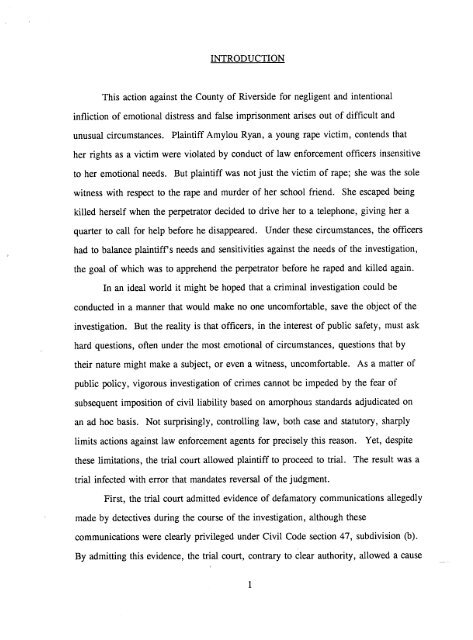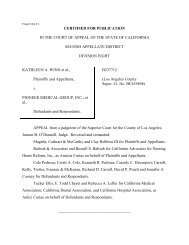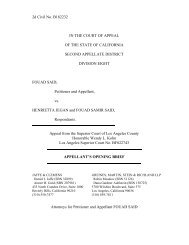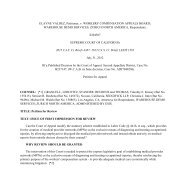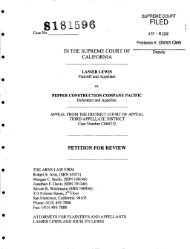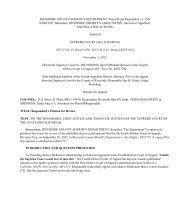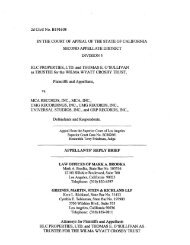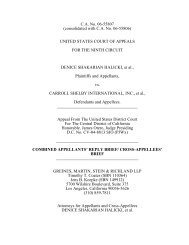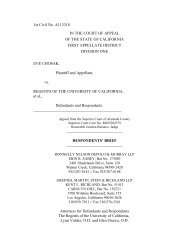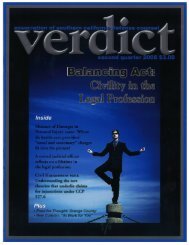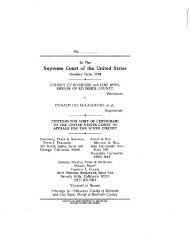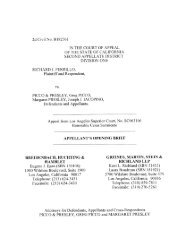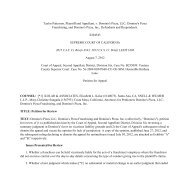Amylou R. v. County of Riverside Appellant's Opening Brief
Amylou R. v. County of Riverside Appellant's Opening Brief
Amylou R. v. County of Riverside Appellant's Opening Brief
You also want an ePaper? Increase the reach of your titles
YUMPU automatically turns print PDFs into web optimized ePapers that Google loves.
INTRODUCTION<br />
This action against the <strong>County</strong> <strong>of</strong> <strong>Riverside</strong> for negligent and intentional<br />
infliction <strong>of</strong> emotional distress and false imprisonment arises out <strong>of</strong> difficult and<br />
unusual circumstances.<br />
Plaintiff <strong>Amylou</strong> Ryan, a young rape victim, contends that<br />
her rights as a victim were violated by conduct <strong>of</strong> law enforcement <strong>of</strong>ficers insensitive<br />
to her emotional needs. But plaintiff was not just the victim <strong>of</strong> rape; she was the sole<br />
witness with respect to the rape and murder <strong>of</strong> her school friend.<br />
She escaped being<br />
killed herself when the perpetrator decided to drive her to a telephone, giving her a<br />
quarter to call for help before he disappeared.<br />
Under these circumstances, the <strong>of</strong>ficers<br />
had to balance plaintiff's needs and sensitivities against the needs <strong>of</strong> the investigation,<br />
the goal <strong>of</strong> which was to apprehend the perpetrator before he raped and killed again.<br />
In an ideal world it might be hoped that a criminal investigation could be<br />
conducted in a manner that would make no one uncomfortable, save the object <strong>of</strong> the<br />
investigation.<br />
But the reality is that <strong>of</strong>ficers, in the interest <strong>of</strong> public safety, must ask<br />
hard questions, <strong>of</strong>ten under the most emotional <strong>of</strong> circumstances, questions that by<br />
their nature might make a subject, or even a witness, uncomfortable.<br />
As a matter <strong>of</strong><br />
public policy, vigorous investigation <strong>of</strong> crimes cannot be impeded by the fear <strong>of</strong><br />
subsequent imposition <strong>of</strong> civil liability based on amorphous standards adjudicated on<br />
an ad hoc basis.<br />
Not surprisingly, controlling law, both case and statutory, sharply<br />
limits actions against law enforcement agents for precisely this reason.<br />
Yet, despite<br />
these limitations, the trial court allowed plaintiff to proceed to trial.<br />
The result was a<br />
trial infected with error that mandates reversal <strong>of</strong> the judgment.<br />
First, the trial court admitted evidence <strong>of</strong> defamatory communications allegedly<br />
made by detectives during the course <strong>of</strong> the investigation, although these<br />
communications were clearly privileged under Civil Code section 47, subdivision (b).<br />
By admitting this evidence, the trial court, contrary to clear authority, allowed a cause<br />
1


